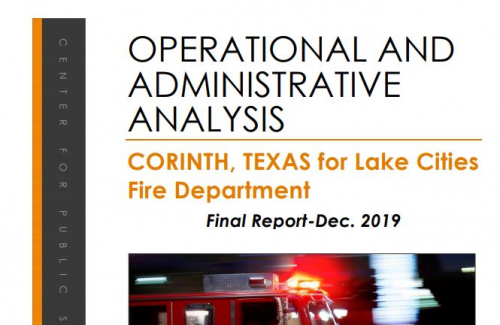Fire Operational & Administrative Analysis
The Center for Public Safety Management LLC., (CPSM) was retained by the City of Corinth to evaluate the Lake Cities Fire Department (LCFD) and conduct an Operational and Administrative Analysis of the Fire Department, including a detailed review of department operations, its interaction with hospital services, workload, staffing, fire stations, fire apparatus, and deployment practices.
This analysis includes a thorough review of the organization’s structure, training, performance measures, prevention activities, and interactions with mutual aid and regional partners. Specifically, CPSM was tasked with providing recommendations and alternatives regarding fire department operations, staffing levels, alternate modes of operation in relation to the current service demand, and options that can position the department to best manage the community’s anticipated rapid growth.
During the study, CPSM analyzed performance data provided by the Lake Cities Fire Department and examined firsthand the department’s operations. CPSM observations are summarized below.
- The Lake Cities Fire Department is a highly skilled and progressive organization that is making exceptional progress in dealing with a very significant and growing workload.
- The personnel with whom CPSM interacted are truly interested in serving the Cities of Corinth, Hickory Creek, Lake Dallas, and Shady Shores to the best of their abilities and demonstrated a unified goal of achieving excellence in service delivery.
- As service demands increase and the fire department is required to provide expanded services, it is essential that the organization continue its strategic planning efforts, organizational team building, performance measurement, and goal setting.
- The current multi-city contractual relationship is providing for the most efficient, most effective, and most affordable service delivery system to all residents. The existing model being used by LCFD has been shown to be effective by several evaluations; splitting or attempting “cheaper” service delivery increases the risk and cost to communities.



